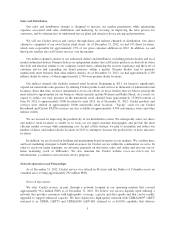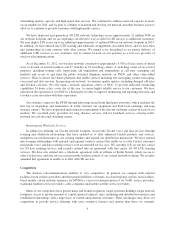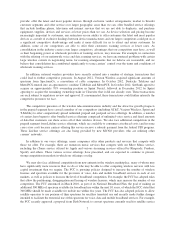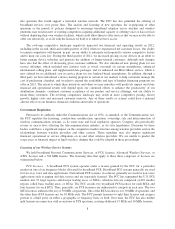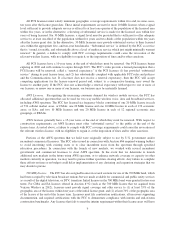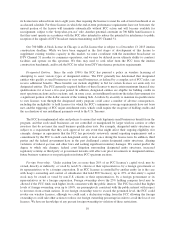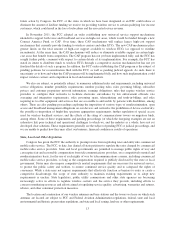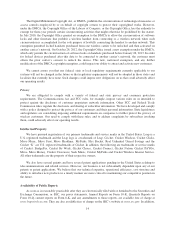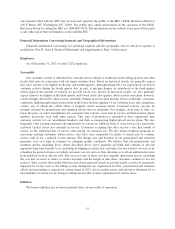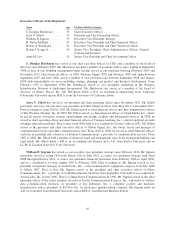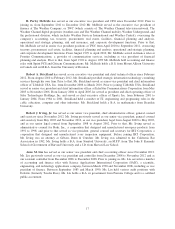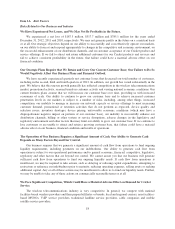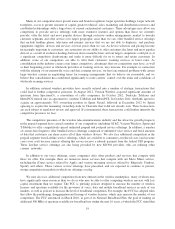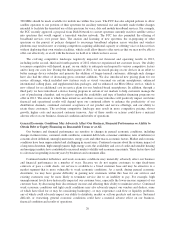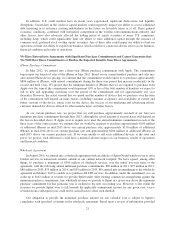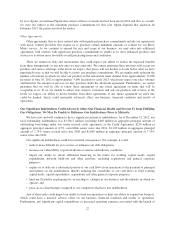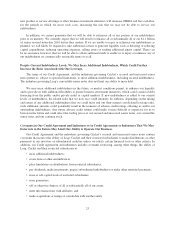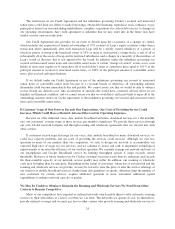Cricket Wireless 2012 Annual Report Download - page 28
Download and view the complete annual report
Please find page 28 of the 2012 Cricket Wireless annual report below. You can navigate through the pages in the report by either clicking on the pages listed below, or by using the keyword search tool below to find specific information within the annual report.The Digital Millennium Copyright Act, or DMCA, prohibits the circumvention of technological measures or
access controls employed by or on behalf of copyright owners to protect their copyrighted works. However,
under the DMCA, the Copyright Office of the Library of Congress, or the Copyright Office, has the authority to
exempt for three-year periods certain circumventing activities that might otherwise be prohibited by the statute.
In July 2010, the Copyright Office granted an exemption to the DMCA to allow the circumvention of software
locks and other firmware that prohibit a wireless handset from connecting to a wireless network when such
circumvention is accomplished for the sole purpose of lawfully connecting the handset to another network. This
exemption permitted locked handsets purchased from one wireless carrier to be unlocked and then activated on
another carrier’s network. On October 28, 2012, the Copyright Office issued a new exemption under the DMCA,
which only permits the circumvention of software locks on handsets purchased before January 26, 2013. In order
for locked devices purchased after this date to be connected to another carrier’s network, the customer must
obtain the prior carrier’s consent to unlock the device. This new, narrowed exemption, and any further
modification of the DMCA copyright exemption, could impact our ability to attract and activate new customers.
We cannot assure you that any federal, state or local regulatory requirements currently applicable to our
systems will not be changed in the future or that regulatory requirements will not be adopted in those states and
localities that currently have none. Such changes could impose new obligations on us that could adversely affect
our operating results.
Privacy
We are obligated to comply with a variety of federal and state privacy and consumer protection
requirements. The Communications Act and FCC rules, for example, impose various rules on us intended to
protect against the disclosure of customer proprietary network information. Other FCC and Federal Trade
Commission rules regulate the disclosure and sharing of subscriber information. We have developed and comply
with a policy designed to protect the privacy of our customers and their personal information. State legislatures
and regulators are considering imposing additional requirements on companies to further protect the privacy of
wireless customers. Our need to comply with these rules, and to address complaints by subscribers invoking
them, could adversely affect our operating results.
Intellectual Property
We have pursued registration of our primary trademarks and service marks in the United States. Leap is a
U.S. registered trademark and the Leap logo is a trademark of Leap. Cricket, Cricket Wireless, Cricket Clicks,
Muve Music, Muve First, Muve Headliner, MyPerks, Flex Bucket, Real Unlimited Unreal Savings and the
Cricket “K” are U.S. registered trademarks of Cricket. In addition, the following are trademarks or service marks
of Cricket: BridgePay, Cricket By Week, Cricket Choice, Cricket Connect, Cricket Nation, Cricket PAYGo,
Muve, Muve Money, Cricket Crosswave, Seek Music, Cricket MyPerks and Cricket Wireless Internet Service.
All other trademarks are the property of their respective owners.
We also have several patents and have several patent applications pending in the United States relating to
telecommunications and related services. However, our business is not substantially dependent upon any of our
patents or patent applications. We believe that our technical expertise, operational efficiency, cost structure and
ability to introduce new products in a timely manner are more critical to maintaining our competitive position in
the future.
Availability of Public Reports
As soon as is reasonably practicable after they are electronically filed with or furnished to the Securities and
Exchange Commission, or SEC, our proxy statements, Annual Reports on Form 10-K, Quarterly Reports on
Form 10-Q, current reports on Form 8-K, and any amendments to those reports, are available free of charge at
www.leapwireless.com. They are also available free of charge on the SEC’s website at www.sec.gov. In addition,
14



